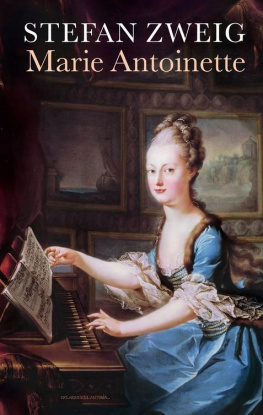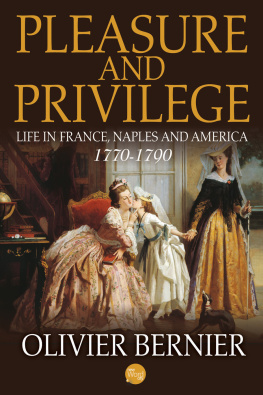Bernier Olivier - Louis XIV
Here you can read online Bernier Olivier - Louis XIV full text of the book (entire story) in english for free. Download pdf and epub, get meaning, cover and reviews about this ebook. City: France, year: 2018, publisher: New Word City, genre: Non-fiction. Description of the work, (preface) as well as reviews are available. Best literature library LitArk.com created for fans of good reading and offers a wide selection of genres:
Romance novel
Science fiction
Adventure
Detective
Science
History
Home and family
Prose
Art
Politics
Computer
Non-fiction
Religion
Business
Children
Humor
Choose a favorite category and find really read worthwhile books. Enjoy immersion in the world of imagination, feel the emotions of the characters or learn something new for yourself, make an fascinating discovery.
- Book:Louis XIV
- Author:
- Publisher:New Word City
- Genre:
- Year:2018
- City:France
- Rating:5 / 5
- Favourites:Add to favourites
- Your mark:
- 100
- 1
- 2
- 3
- 4
- 5
Louis XIV: summary, description and annotation
We offer to read an annotation, description, summary or preface (depends on what the author of the book "Louis XIV" wrote himself). If you haven't found the necessary information about the book — write in the comments, we will try to find it.
Louis XIV — read online for free the complete book (whole text) full work
Below is the text of the book, divided by pages. System saving the place of the last page read, allows you to conveniently read the book "Louis XIV" online for free, without having to search again every time where you left off. Put a bookmark, and you can go to the page where you finished reading at any time.
Font size:
Interval:
Bookmark:
Many who are subjects would be very poor rulers; it is far easier to obey a superior than to command ones own self; and when we can do anything we want, it is difficult to want only what is right.
Louis XIV

Louis XIII meant to go, Queen Anne did not expect him: It took the prayers of a nun, the bad temper of an attendant, and a violent, freezing rainstorm to bring them together , but when he came, she set herself to please. They shared the same bed because there was no other; nine months later to the day, France celebrated the birth of a baby boy whom his contemporaries and posterity alike have called the Sun King.
It was, many people said, a miracle, an act of God: After twenty-three years of unfruitful and increasingly bitter union, the king despised the queen and avoided her whenever possible. It was not only that Louis XIII vastly preferred the company of handsome young men, or that in the early days of their marriage Anne of Austria had miscarried three times: Since then, she had joined the group at Court who fought the prime minister, the cardinal de Richelieu, on every issue; worse still, she had actually engaged in a traitorous correspondence with her brother, King Philip IV of Spain, in the midst of a raging war.
Still, in spite of their hatred for each other, the king and queen both wanted an heir: As things stood, Louis XIIIs brother Gaston would inherit the throne and destroy all he had accomplished, and the queen dreaded being sent away in disgrace. Unfortunately, the birth of a dauphin (girls, in France, could not inherit the throne) was hardly possible as long as Louis and Anne abstained from all physical contact. And given the situation, the k ing was most unlikely ever to sleep with the q ueen again.
When, on the afternoon of December 5, 1637, Louis XIII stopped in at the convent of the Visitandines in Paris, to see Louise de La Fayette, now a nun, and formerly his (chaste) love, he was on his way from Versailles, where he had a small hunting lodge, to Saint Maur, where he planned to spend the night, while the queen was settled at the Louvre for the winter. And since, in the 1630s, royal residences were largely empty shells
furnished only when the king lived there, Louis XIIIs bed, linens, and other necessities preceded him to Saint Maur.
As it was, the king found his conversation with Louise de La Fayette so absorbing that by the time he decided to leave, night had fallen, while a torrential rainstorm was in progress. In spite of this weather, he persisted in his earlier plan, but M. de Guitaut, the captain of the guard, suggested that he go to the Louvre instead. Of course, Louis XIII immediately pointed out that his apartment there was unfurnished, only to have M. de Guitaut suggest that he spend the night with the queen, adding that it would be inhuman on the kings part to expect his escort to ride out to Saint Maur in a rainstorm.
Instead, Louis decided to wait for a break in the weather. After a few moments, Guitaut repeated his suggestion. This time, the king answered that Anne of Austria, who had retained her Spanish habits, ate her suppers at an impossibly late hour. Daringly, Guitaut answered that the queen would, no doubt, change that to please him. This time, his master gave in. He was forced to share the Queens bed, Mme de Motteville, her faithful lady in waiting noted,... so that it has been said that the encounter gave us our present King [Louis XIV]. When the Queen received this grace from Heaven, she badly needed it to save her from all the sufferings which seemed to await her [as the result of the correspondence].
There can hardly be any doubt that the birth of the dauphin was the direct result of that unexpected encounter. Exactly nine months later to the day, the queen gave birth to the long-awaited heir to the throne, and because neither parent had any doubt that this arrival was the work of Providence, the baby was named Louis-Dieudonn, Louis, the Gift of God.
The queens unexpected pregnancy naturally caused a great stir. Already on January 14, 1638, Bouvard, the kings first physician, officially informed Richelieu of the event, thus causing the usually pessimistic cardinal immense pleasure. Still, there was much to worry about: Anne of Austria, after all, had a history of miscarriages, but by late April, it seemed, the worst was over; for the first time in some twenty years, Louis XIII actually paid attention to his wife. The King, at the beginning of [the Queens] pregnancy, showed her how pleased he was, and was even tender with her, Mme de Motteville reported; indeed, a new harmony now united old enemies: Richelieu, well aware that, as the dauphins mother, the queen would become a power in her own right, suddenly became obliging and amiable; while Anne, who was anxious not to be separated from her child, immediately started propitiating both the cardinal and the king. As for the latter, he gave up following his army to Picardy, where the front still was, to stay near his pregnant wife, and, of course, he was present at the birth itself. More, according to Alvise Contarini, the Venetian ambassador, he held Anne in his arms as she was giving birth.
Of course, the baby might have turned out to be a girl after all, a fact about which no one seemed to worry, and medical complications were not unlikely since the queen was about to give birth for the first time at the age of thirty-eight, but all went well. The joy His Majesty feels in being a father is extraordinary, Contarini reported. His Majesty went today four or five times to Monseigneur the Dauphins room to see him breastfeeding
The king had good reason to rejoice: the birth of an heir must, everyone agreed, put an end to the long series of conspiracies based on the status of Gaston, duc dOrlans; that should have become truer still when, in 1640, the queen was delivered of a second boy, Philippe , but old habits die hard. The last and perhaps most spectacular anti-Richelieu plot of the reign ran its course in 1641-42 and ended, but only just, with the cardinal s reaffirmed supremacy.
It seemed fairly sure, however, that, as the dauphin grew up, the duc dOrlans, that linchpin of every plot, would become increasingly less important; on the other hand, France, like England, had a solid tradition of conflict between the sovereign and his heir, something the ever-suspicious Louis XIII knew very well. Monseigneur the little Dauphin was not even three before he apparently worried and annoyed [the King], Mme de Motteville wrote. One day, coming back from some hunting trip, the little prince saw [his father] wearing a nightcap; he began to cry because he was frightened as he was not used to seeing him like that. The King was as angry as if it had been a thing of much consequence; he complained to the Queen, accused her of teaching his son to feel aversion for him and threatened her very roughly with the removal of both children from her care. This incident took place in 1641; with the Cinq-Mars conspiracy the following year, the kings suspicion grew, and it took very fast footwork and many a humble protest of devotion to both king and cardinal before Anne could be sure of keeping her children. What that may have cost the proud Habsburg is not hard to imagine; still, she maintained her status: Keeping the two boys not only satisfied her very real maternal feelings, it also ensured that, should something happen to the king, she would be in a position of power.
Those who banked on the kings death had been disappointed often before; as for Richelieu, who also suffered from a variety of excruciatingly painful diseases, his contemporaries seem to have thought him immortal. Thus, when on December 17, 1642, he succumbed to a final illness, his death took everyone by surprise. It was followed by a moment of intense suspense: Would the king, now that he was free of the cardinals forceful personality, change his policies and the rest of his ministers? Would he be ruled by a new favorite favorable to the anti-Richelieu party? It is, in fact, a measure of Louis XIIIs steadfastness that he did no such thing. Richelieu was succeeded by the very man he had chosen for his place, a brilliantly intelligent Italian of rather humble origin, Giulio Mazarini.
Font size:
Interval:
Bookmark:
Similar books «Louis XIV»
Look at similar books to Louis XIV. We have selected literature similar in name and meaning in the hope of providing readers with more options to find new, interesting, not yet read works.
Discussion, reviews of the book Louis XIV and just readers' own opinions. Leave your comments, write what you think about the work, its meaning or the main characters. Specify what exactly you liked and what you didn't like, and why you think so.









